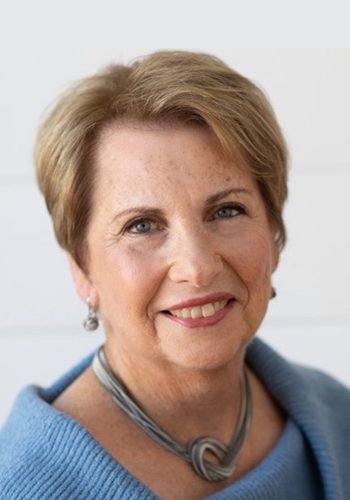
Myrna Marofsky
Myrna Marofsky, Author, Consultant and Speaker redefines “Caregiving” to “Care-LIVING” and encourages compassionate organizations and providers to incorporate this philosophy at times when a difficult medical diagnosis can be overwhelming. This means building empathic relationships by balancing head and heart and adding hints of hope in the despair. The result will be better outcomes for all parties, including higher patient and job satisfaction.
Speaking Topics
Senior Care and Aging Population
Patient Service
Patient Experience
Service Excellence/Customer Service
Burnout
Patient Safety
Nursing Leadership
Quality Improvement
Myrna Marofsky is a serial entrepreneur and self-acclaimed “Champion of Women.” For the past 20 years, her work as a consultant has been coaching, mentoring, and supporting women business owners through their successes and extreme challenges, including the pandemic. Her business tagline was finding “possibilities that turn dreams into reality.” Then in 2015 when her husband of 51 years was diagnosed with Early-Stage Alzheimer’s her life was turned upside-down. She was living a reality she could never have imagined, and her tagline became, “finding possibilities in realities that were far from my dreams.”
Marofsky’s story sheds light on an untold facet of a life-changing diagnosis, those on the other side—partners and spouses who also receive a diagnosis. They become part of the millions of unpaid caregivers, most of them women, who are suffering emotionally, mentally, physically, and financially, all while losing the one they love. They are feeling alone.
Because it’s a story rarely told, this diagnosis goes untreated at a high cost to our healthcare systems and government agencies.
"Who cares for the caregivers?”
Rather than a list of tactical and systemic changes, Marofsky speaks from her heart, sharing a lived experience with gems of insight and understanding for those interacting with care partners. As a care partner, she highlights the impact of the “tragedy talk” she continually received from professionals, noting how things could have been different. As a wife, she demonstrates how she built a strategy to keep bad news from becoming a bad life. As a woman, she speaks frankly about how she kept from becoming a lesser version of herself through the five years of living with dementia.
Author: The Art of Diversity Training and Getting Started With Mentoring as well as her latest To The Last Dance, A Partner's Story of Living and Loving Through Dementia.
Chapter Chair: Women Presidents Organization women-presidents.com
Founder: The Business Women's Circle. www.thebwc.org
Co-owner/President: ProGroup, Diversity consulting and training
Co-creator of WisePacks™, a travel backpack purse for women.
Awards: Power 50, NAWBO 2010 Women Achieve! Vision Award

WATCH Myrna’S SPEAKER REEL
Testimonials
KEYNOTE TOPICS
-
When Myrna Marofsky’s husband was diagnosed with dementia, she refused to let their bad news become a bad life. Rejecting the “tragedy talk” she often heard, Myrna sought a more hopeful way to navigate their journey while preserving their loving relationship and maintaining her own sense of self.
Through personal experience, research, and interviews, Myrna sheds light on the emotional and physical toll caregivers face. In her engaging and lighthearted style, she introduces the Five Fatigues of Caregiving, helping audiences understand the burdens care partners carry and inspiring them to provide meaningful support.
With 53 million adults in the U.S. caring for loved ones—and 22% of them juggling careers alongside caregiving—this message is more important than ever. Employers, healthcare professionals, and advisors often overlook simple yet powerful ways to ease a caregiver’s load. Even small gestures can make a big difference.
Myrna’s presentation is designed for anyone who interacts with care partners, including: Care providers Spouses, partners & families Medical students & professionals Employers & marketing teams Counselors, therapists & social workers Financial & legal advisors.
Her talks are available both virtually and in person, tailored to meet the unique needs of each audience. Attendees can also access her book, To The Last Dance: A Partner’s Story of Living and Loving Through Dementia, at a special discounted rate. A message of understanding, compassion, and resilience—because caregiving is more than a responsibility; it’s a human experience.
-
Virtual or In Person
Customized to group dynamics including:
Care providers
Partners/spouses/families
Medical students
Marketing departments
Counselors/Therapists/social workers
Other
Marofsky’s book To The Last Dance, A Partner’s Story of Living and Loving Through Dementia is available at a discount with presentation.

Book Myrna Marofsky
Fee Range: <$5,000

